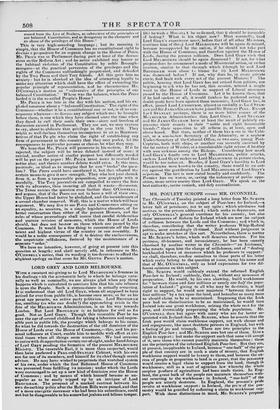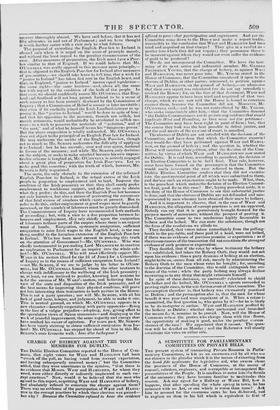MR. POULETT SCROPE versus MR. O'CONNELL.
THE Chronicle of Tuesday printed a long letter from Mr. ScROPE to Mr. O'CoNtesu. on the subject of Poor-laws for Ireland,—a
letter full of petulance, not to say spite ; which attributes bad motives to the person addressed; which seeks to depreciate, not only O'CONNELL's general exertions for his country, but also those measures of Reform fur Ireland which are now ihe subject of collision between the Lords and the Commons; mid which is, therefore, considering that the writer professes Whig-Radical politics, most exceedingly ill-timed. Zeal without judgment is apt to make mistakes of this sort. Nevertheless, there is matter in Mr. SCROPE'S letter, which well deserves attention. For his
pertness, ill-humour, and inconsistency, he has been sniartly chastised by another writer in the Chronicle—" an Irishman,' who retorts upon him the charge of selfishness, and of "dealing backhanded blows at measures which he professes to support:" we shall, therefore, confine ourselves to those parts of his letter which really belong to the question at issue, using his name and that of Mr. OCONNELL, only as brief expressions for two dif- ferent opinions on this subject. Mr. SCROPE would suddenly extend the reformed English Pour-law to Ireland; suddenly, that is, without any measures of preparation. He would, by his own showing, build workhouses for " between three and four millions or nearly one half the popu- lation of Ireland :" giving to all who may be destitute, a legal right to support, he would now maintain "between three and four millions" by a tax upon the land, and hereafter as many more as should claim to be so maintained. Supposing that the Irish poor had no disinclination to be so maintained, he would turn Ireland into one great workhouse, seizing the whole rent for the poor, and irrevocably pauperizing the whole population. Mr. O'CONNELL does but agree with many who are far better ac- quainted with Ireland than Mr. SCROPE, when he asserts that the Irish poor would claim workhouse support, not with shame and and repugnance, like most destitute persons in England, but with a feeling of joy and triumph. There are two principles in the English Poor-law ; and Mr. SCROPE sees but one of them. Give a right to support ; but make the support such that none will accept of it, save those who cannot possibly maintain themselves: these are the principles of the reformed English Poor-law. But they are, at present, inapplicable to Ireland, because "one-half" of the peo- ple of that country are in such a state of misery, that English workhouse support would be luxury to them, and because the ex- cess of people in proportion to land is so great, that the peasantry would receive a legal claim to support from the land, though in workhouses, still as a sort of agrarian law whereby the whole surplus produce of agriculture bad been made theirs. In Eng- land, the great bulk of the people can maintain themselves with- out resorting to the workhouse: in Ireland, "one-half" of the people are utterly destitute. In England, the peasant's pride revolts at workhouse support: in Ireland, the pride of the pea- santry would be gratified by enforcing a claim to workhouse sup- port. With these distinctions in mind, Mr. SCROPE'S proposal appears thoroughly absurd. We have said before, that it has not fifty adeceates in and out of Parliament ; and we have thought it worth further notice with a view only to what follows, -The proposal of extending the English. Poor-law to Ireland is absurd only when it is urged on the score of principle merely, and without the least regard to the peculiar circumstances of the case. After measures of preparation), the Irish must hate a Poor-
law similar to that of England. If we could believe that feIr. O'CONNELL was really opposed to this measure upon principle,— that he objected to the English Poor-law for Ireland after measures of prmaration,—we should take leave to tell him, that a wish for
"justice to Ireland " has taken fast root in the English heart, and that, in England, "justice to Ireland" means equal legislation—
the same rights—the same burdens—and, above all, the same law with regard to the condition of the bulk of the people. In that case, we should confidently assure Mr. Otomeess that Eng- land and Scotland will not long permit Ireland to be a scene of such misery as has been recently disclosed by the Commission of Inquiry ; that a Commission of Relief is sooner or later inevitable ; that even if he cordially joined the Irish Landlord-interest in op- posing it, this " justice to Ireland " would be done in spite of him; and that his opposition to the measure, flume!' not selfish, but merely erroneous, would undoubtedly be attributed to selfish mo- tives—to a wish to preserve the materials of " aeitation," and of "the rent," and of what he himself terms his "dangonus power."
But the above supposition is wholly unfounded. Mr. Otoxeress does not object to the principle of an English Poor law for Ireland. He may underrate the merits of the English Poor-law, though net as much as Mr. SCROPE underrates the difficulty of applying it to Ireland : but he has recently, over and over again, declared in favour of the measure; and while Mr. SCROPE only declnions on the subject, or seeks to make mischief because his own imprac- ticable scheme is laughed at, Mr. More elms is actively engaged about a great plan of preparation for Irish Pnor-'nws. Let us make good this assertion; with the truth of which, however, Mr. SCROPE is fully acquainted. The main, the only obstacle to the extension of the reformed English Poor-law to Ireland, is the actual excess of the Irish people in proportion to employment and to land. Improve the condition of the Irish peasantry so that they shall surely prefer employment to workhouse support, and also be sure to obtain what they prefer; do this, and then the English Poor- law becomes mot only harmless, but also a means of preventing the recurrence of that fatal excess of numbers which exists at present. But in order to do this, eitheremployment at good wages must be greatly increased, or the number of labourers must be greatly diminished. The Commissioners of Inquiry have recommended both methods of proceeding ; but, with a view to a due proportion between la- bourers and employment, tliey rely chiefly upon the emigration of labourers to those parts of the empire where there is an urgent want of hands. Emigration, systematic emigration, sufficient emigration to raise Irish wages to the English level, is the one thing needful to the harmless extension of the English Poor-law to Ireland. Who has been most earliest in pressing this truth on the attention of Government?—Mr. O'CONNELL. Who was chiefly instrumental in persuading Lord MELBOURNE to sanction an application to Parliament for an inquiry into the whole sub- ject?—Mr. O'CoNNEI.L. Who will most effectively support Mr. WARD in his motion (fixed for the 2(1 of June) for a Committee of Inquiry as to the means of sufficient emigration from Ireland? —not Mr. SCROPE, if we are to judge by his letter to O'CON- NELL, but Mr. O'CONNELL himself whom the other ventures to charge with indifference to the wellbeing of the Irish peasantry : so, at least, we are inclined to predict, knowing how anxious he is for the success of Mr. WARD'S motion, and believing that his view of the state and disposition of the Irish peasantry, and of the best means for improving their physical condition, will prove not less interesting than instructive to both parties in the House. This is not a party question ; nor will Mr. SCROPE, with all his lack of good taste, temper, and judgment, be able to make it one. This is neutral ground, on which Mr. O'CONNELL appears in a new character—heartily cooperating with party opponents—flying in the face of a vulgar prejudice—adopting, nay, giving effect to the speculative views of Saxon economists—and displaying in the wok of peaceful improvement, the same sagacity and energy that have marked his career of agitation. For years past, Mr. SCROPE has been vainly striving to obtain sufficient emigration from Ire- land : Mr. O'CONNELL has stepped far ahead of him in this Mr. SCROPE'S once favourite walk : hint illre lachrymee



























 Previous page
Previous page